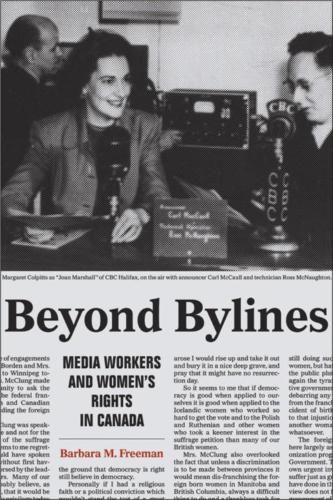Readings Newsletter
Become a Readings Member to make your shopping experience even easier.
Sign in or sign up for free!
You’re not far away from qualifying for FREE standard shipping within Australia
You’ve qualified for FREE standard shipping within Australia
The cart is loading…






Beyond Bylines: Media Workers and Women’s Rights in Canada explores the ways in which several of Canada’s women journalists, broadcasters, and other media workers reached well beyond the glory of their personal bylines to advocate for the most controversial women’s rights of their eras. To do so, some of them adopted conventional feminine identities, while others refused to conform altogether, openly and defiantly challenging the gender expectations of their day. The book consists of a series of case studies of the women in question as they grappled with the concerns close to their hearts: higher education for women, healthy dress reforms, the vote, equal opportunities at work, abortion, lesbianism, and Aboriginal women’s rights. Their media reflected their respective eras: intellectual magazines, daily and weekly newspapers, radio, feminist public relations, alternative women’s periodicals, and documentary film made for television. Barbara Freeman takes an interdisciplinary approach, combining biography, history, and communication studies to demonstrate how their use of different media both enabled and limited these women in their ability to be daring advocates for gender equality. She shows how a number of these women were linked through the generations by their memberships in activist women’s organizations.
$9.00 standard shipping within Australia
FREE standard shipping within Australia for orders over $100.00
Express & International shipping calculated at checkout
Beyond Bylines: Media Workers and Women’s Rights in Canada explores the ways in which several of Canada’s women journalists, broadcasters, and other media workers reached well beyond the glory of their personal bylines to advocate for the most controversial women’s rights of their eras. To do so, some of them adopted conventional feminine identities, while others refused to conform altogether, openly and defiantly challenging the gender expectations of their day. The book consists of a series of case studies of the women in question as they grappled with the concerns close to their hearts: higher education for women, healthy dress reforms, the vote, equal opportunities at work, abortion, lesbianism, and Aboriginal women’s rights. Their media reflected their respective eras: intellectual magazines, daily and weekly newspapers, radio, feminist public relations, alternative women’s periodicals, and documentary film made for television. Barbara Freeman takes an interdisciplinary approach, combining biography, history, and communication studies to demonstrate how their use of different media both enabled and limited these women in their ability to be daring advocates for gender equality. She shows how a number of these women were linked through the generations by their memberships in activist women’s organizations.